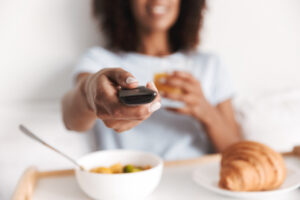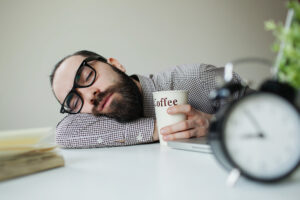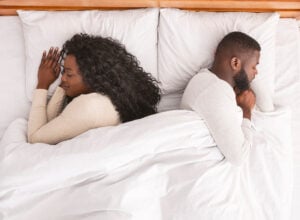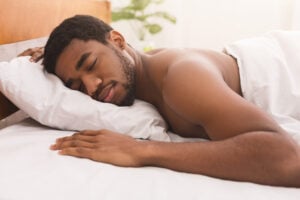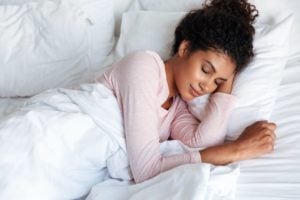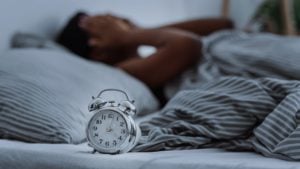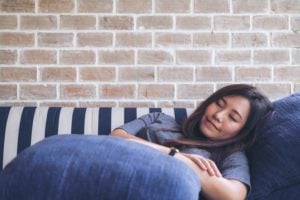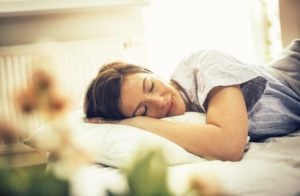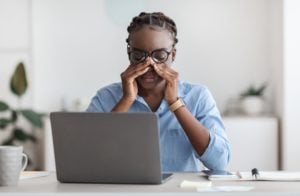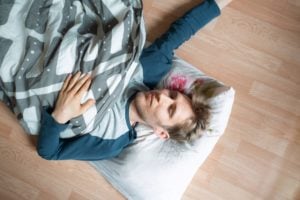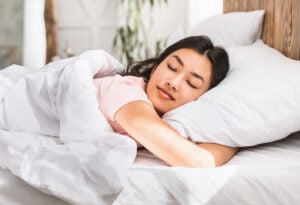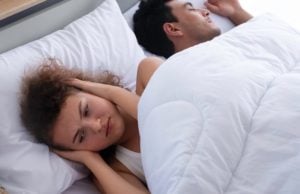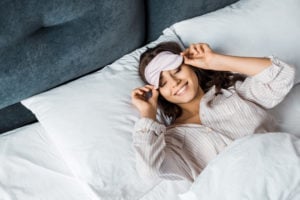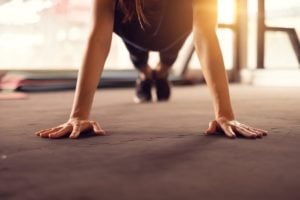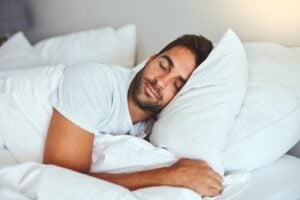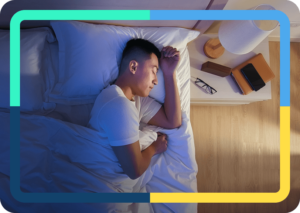How to Wake Up Early: 7 Expert-Tested Tips
More than half of adults hit the snooze button when waking up in the morning, suggesting they find waking up to their first alarm difficult. Many who snooze may do so because their sleep was disrupted or they are naturally “night owls.” Others struggle to wake up when they want due to sleep or mood disorders.
We cover expert-tested tips to wake up earlier and feel refreshed and ready to start your day.
Set an Earlier Bedtime
Over one-third of U.S. adults do not get the recommended amount of sleep, which is seven or more hours per night. Trouble waking up in the morning may indicate that you haven’t yet slept enough that night.
By going to sleep earlier, you can give yourself the chance to sleep more before your alarm goes off in the morning. You’ll know you’re going to bed early enough when you begin waking up feeling refreshed.
Going to bed earlier may even provide health benefits. Research shows that the timing of when people sleep is tied to health and adults who get their sleep earlier in the night have fewer negative health issues.
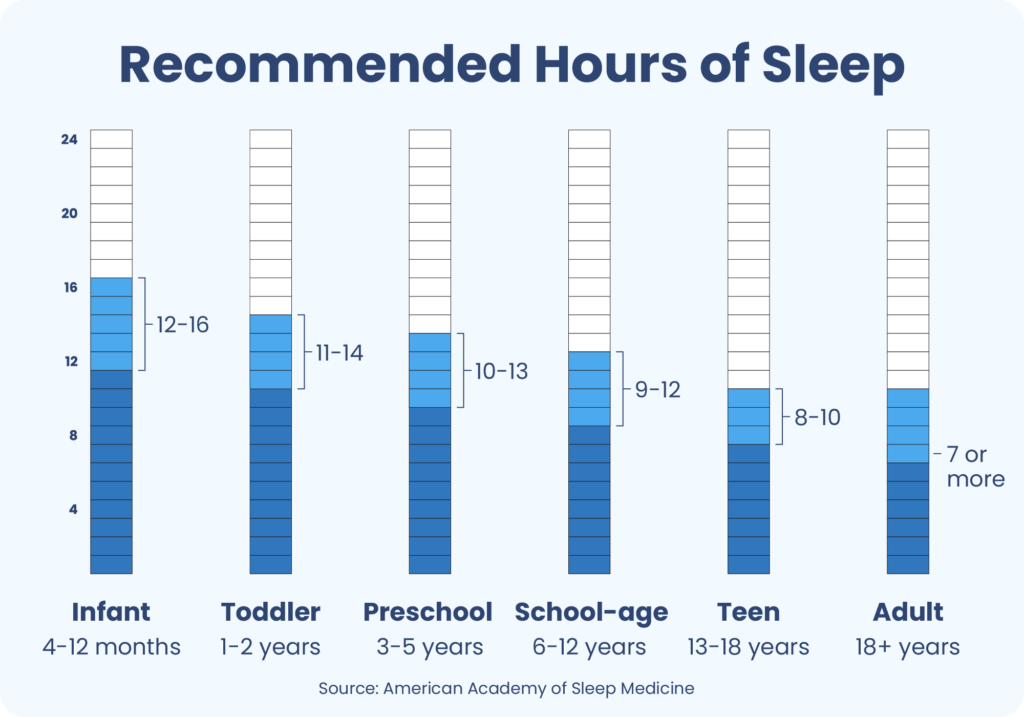
Limit Caffeine and Alcohol Consumption
Consuming caffeine even six hours before sleeping can disrupt sleep. Similarly, consuming alcohol in the hours before bed has also been demonstrated to disrupt sleep.
Disrupted sleep is associated with feeling unrefreshed in the morning and hitting the snooze button. For these reasons, it’s best to limit or avoid caffeine and alcohol, at least in the evenings, when you’re trying to make waking up an easier endeavor.If you decide to continue consuming caffeine, be strategic about the timing. In one study, participants who had a tendency to go to sleep and wake up later were able to shift their sleep schedule earlier in part by only consuming caffeine prior to 2 p.m.
Eat a Healthy Breakfast
In one study, participants who ate a breakfast that contained higher amounts of carbohydrates that did not spike blood sugar levels felt more alert for the rest of that morning. Healthy carbohydrates that are not likely to spike blood sugar include steel-cut oats, whole grain bran flakes, whole grain bread, and most fruits and vegetables.
A sugary breakfast made study participants feel less alert, so be sure not to opt for a high-carbohydrate breakfast that is also high in sugar or highly refined. Most breakfast cereals, bagels, donuts, and white breads are likely to spike blood sugar.
Eat Meals Earlier Rather Than Later
If you struggle to wake up in the morning because you stay up late, altering when you eat may help. Earlier meal times have been found to help people shift their bedtimes and wake times earlier. In one study, participants successfully shifted their sleep schedule two hours earlier by eating breakfast shortly after waking up, eating lunch at the same time every day, and not eating after 7 p.m.
Shifting meal times earlier can potentially impact your sleep schedule by affecting your circadian rhythms. Circadian rhythms are biological fluctuations that occur in the body over each 24-hour period and can impact when we feel tired or alert. The timing of factors like meals, light exposure, and physical activity can alter human circadian rhythms.
Get Morning Light Exposure
Bright light exposure in the morning can also help shift a person’s sleep schedule, making sleep and wake times earlier. If possible, try to maximize light exposure by spending time outside in the morning. You may consider eating breakfast in the sunlight or exercising outdoors.
If going outside in the morning isn’t possible due to weather or your work schedule, consider looking into bright light therapy. Bright light therapy involves sitting in front of a lamp or light box that emits bright light.
Exercise Strategically
Exercising in the morning can help shift a person’s sleep schedule earlier. Regular exercise can also improve sleep quality and reduce daytime tiredness, especially in people with insomnia.
Night people may find that they can also shift their sleep schedule earlier while exercising in the evening. However, exercising in the evening may shift the sleep schedules of morning people later. Experiment with exercising at different times of day, then stick with what seems to help you sleep best.
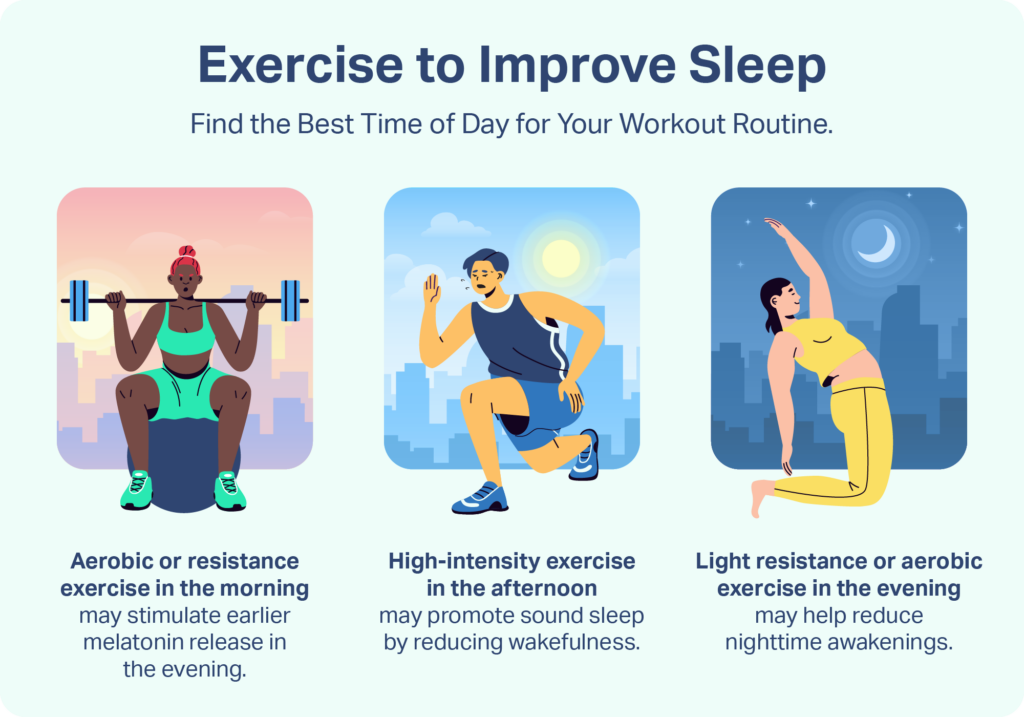
Avoid Light Exposure Before Bed
Evening light exposure can throw off your sleep schedule, because circadian rhythms can be disrupted by exposure to light during periods of time when it’s dark outside. Strategies for reducing light exposure at night involve dimming lights, using blackout curtains while sleeping, avoiding digital devices before bed, or wearing special glasses that filter out blue light while using digital devices in the evening.
Why Is Waking Up in the Morning Always a Struggle?
Different people struggle to wake up in the morning for different reasons.
- Sleep deprivation: Having trouble waking up may indicate a person isn’t getting enough sleep. People might not sleep enough because they stay up too late or because their sleep is disrupted.
- Chronotype: “Night owls,” or people who have a tendency toward what is called eveningness, naturally prefer to go to sleep and wake up later. If work or school timing requires them to wake up before they’ve gotten enough sleep, mornings might feel difficult.
- Sleep disorders: Certain sleep disorders may make a person feel groggy when they wake up, including idiopathic hypersomnia, which causes a person to need much more sleep than average, and delayed sleep phase syndrome (DSPS), which causes a person to go to sleep and wake up much later than normal. Sleep apnea, insomnia, and restless legs syndrome can also cause daytime tiredness.
- Mood disorders: Waking up is more difficult for people with mood disorders, particularly depression. While this trouble waking could be related to sleep, it could also stem from mood-related symptoms, like dread about beginning the day.
- Health issues: Many medical disorders can cause a person to require more sleep than normal or feel more tired than normal during the day, both of which may impact a person’s mornings. Medications to treat health issues may also impact how tired a person feels during the day.
When to Talk to Your Doctor
If you’ve tried these tips and waking up when you need to is still difficult, you might want to talk to your doctor. Feeling excessively tired can be associated with sleep disorders, depression, and other illnesses. Your doctor can ask questions and order testing if necessary to determine what might be causing your trouble each morning.
References
5 Sources
-
Centers for Disease Control and Prevention (CDC). (2022, November 2). Sleep and sleep disorders: Adults. Centers for Disease Control and Prevention (CDC).
https://www.cdc.gov/sleep/data-and-statistics/Adults.html -
Paruthi, S., Brooks, L. J., D’Ambrosio, C., Hall, W. A., Kotagal, S., Lloyd, R. M., Malow, B. A., Maski, K., Nichols, C., Quan, S. F., Rosen, C. L., Troester, M. M., & Wise, M. S. (2016). Consensus statement of the American Academy of Sleep Medicine on the recommended amount of sleep for healthy children: Methodology and discussion. Journal of Clinical Sleep Medicine, 12(11), 1549–1561.
https://pubmed.ncbi.nlm.nih.gov/27707447/ -
Chaput, J. P., Dutil, C., Featherstone, R., Ross, R., Giangregorio, L., Saunders, T. J., Janssen, I., Poitras, V. J., Kho, M. E., Ross-White, A., Zankar, S., & Carrier, J. (2020). Sleep timing, sleep consistency, and health in adults: A systematic review. Applied Physiology, Nutrition, and Metabolism = Physiologie Appliquee, Nutrition et Metabolisme, 45(10 (Suppl. 2)), S232–S247.
https://pubmed.ncbi.nlm.nih.gov/33054339/ -
Facer-Childs, E. R., Middleton, B., Skene, D. J., & Bagshaw, A. P. (2019). Resetting the late timing of ‘night owls’ has a positive impact on mental health and performance. Sleep Medicine, 60, 236–247.
https://pubmed.ncbi.nlm.nih.gov/31202686/ -
Vallat, R., Berry, S. E., Tsereteli, N., Capdevila, J., Khatib, H. A., Valdes, A. M., Delahanty, L. M., Drew, D. A., Chan, A. T., Wolf, J., Franks, P. W., Spector, T. D., & Walker, M. P. (2022). How people wake up is associated with previous night’s sleep together with physical activity and food intake. Nature Communications, 13(1), 7116.
https://pubmed.ncbi.nlm.nih.gov/36402781/


